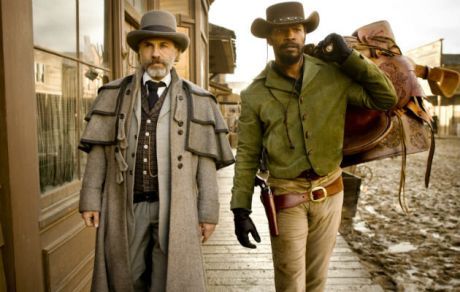Arts
You are here
Django Unchained: a vivid, violent anti-racist fantasy

January 26, 2013
Full disclosure: I like westerns. I can sit through just about anything with six-guns and saddles, and if you asked me to name my top 10 movies at least three of them would be dusters.
I am less enthusiastic about Quentin Tarantino films. For every interesting set piece there is an annoying discursion; for every clever allusion there is a self-indulgent wink that brings the narrative to a jarring halt. For every Jackie Brown (the only Tarantino film I like without reservation) there is an Inglorious Basterds (which I disliked from beginning to end). For Tarantino, history is primarily popular culture–especially movies. So his films are deliberate fictions based on fictions. Taken together they form a parallel universe where the impossible can happen, and where the prime motivation is revenge, whether for personal or historical crimes. He is not unique in this: revenge is usually the motive in the genre movies he reveres and references.
So, with Django Unchained Tarantino has created a vivid, violent anti-racist fantasy drawing on the conventions of Italian rather than American westerns. The opening scenes show shackled slaves being driven through a surreal, rocky landscape. Any true western fan will instantly recognize the setting even if they don’t know the name Lone Pine, a California location used to film countless cowboy serials and low-budget features, a backdrop subtler but every bit as iconic as John Ford’s beloved Monument Valley. For Tarantino that setting would be just as important as the characters inhabiting it. Lone Pine was the location for a series of important westerns by Budd Boetticher, featuring morally ambivalent characters and as much violence as was permissible in the late 1950’s. Sergio Leone, the director who brought spaghetti westerns to the world, admitted that he took much of his inspiration from Boetticher’s films. The western genre flourished in Europe even as it died out in America.
Now Tarantino repatriates the form and closes the circle. Many of the conventions of spaghetti westerns are here: a garish colour palette; an operatic, often intrusive soundtrack (including a theme written by Ennio Morricone); an amiable disregard for continuity; and most of all heaping helpings of gore-soaked violence. Even the name Django is lifted from a series of films starring Franco Nero, who appears in a cameo here.
But there is another crucial aspect of the spaghetti western genre imported by Tarantino. Many of those films were written and directed by Marxists and leftists. Sergio Corbucci’s original Django featured an over-the-top gang of ex-Confederate racists as foil for the avenging gunslinger, and the European westerns regularly portrayed advancing white settlers and authority figures as racists and villains. This is in stark contrast to American westerns that usually portrayed the Confederacy as a noble failure and former rebel soldiers as protagonists. It is through this lens, not the economic and political reality of the pre-Civil War south, that Tarantino views slavery.
Some, prominently Spike Lee, have condemned Tarantino for this, but Django Unchained should be judged by how well Tarantino achieves his actual intentions. Overall, he succeeds. Lead Jamie Foxx is excellent as the avenging “fastest gun in the south”. Christoph Waltz is even better as German bounty hunter King Schultz–equal parts product of the Enlightenment and cold blooded killer of evil men, Waltz is the only positive white character in sight. It is not enough for them to wipe out a gang of hooded white supremacists: they have to be humiliated first for the dolts they are. Leonardo DiCaprio is suitably cartoonish as the vicious, verbose but none too bright plantation owner Calvin Candie, who relies on his elderly house slave (Samuel L. Jackson) to do his thinking. The duel between racist Candie and liberal Schultz at the dinner table is violent and entirely verbal, and the latter’s rhetorical quick-draw alone is worth the price of admission.
There are weaknesses. Women are only portrayed as victims. There is so much crimson splattered in the climactic shootout that you just want to cry “Okay Quentin, give it a rest.” And while both these things were true to the spaghetti western world he refers to, both are conventions that could have been left behind. But there are more plusses than minuses on the Tarantino balance sheet this time. Its no masterpiece but Django Unchained is a satisfying and resolutely anti-racist entertainment. And it has saddles and six-guns.
Section:
Topics:
- Log in to post comments










